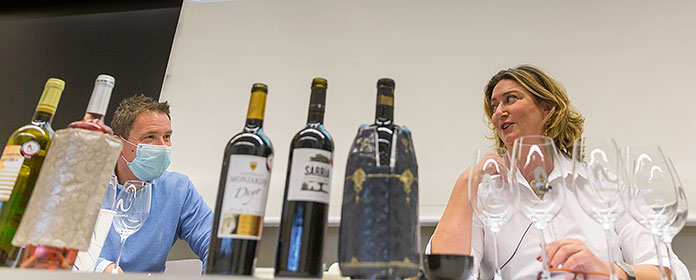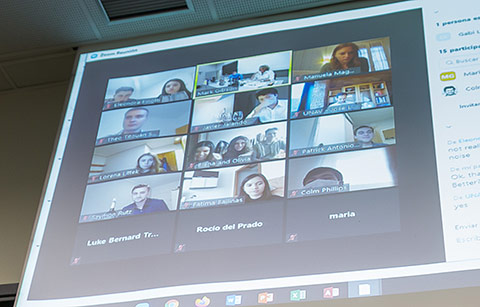Getting to know the culture of Navarre through its wines: proposal of three institutions of the region for international university students
13 students from the University of Navarra, from 11 countries, participate in an online tasting organized with the Academia Navarra de Gastronomía and the D.O. of Navarra.

The University of Navarra, the Navarra Academy of Gastronomy and the Navarra D.O. have organized an online tasting of Navarra wines for international students of the academic center. It is an activity framed in a subject on "The business of wine and gastronomy in Northern Spain", of the Institute of language and Spanish Culture (ILCE) of the School of Philosophy and Letters.
The initiative, in which 13 students participated, was led from the University by the expert oenologist Ana Laguna, vice-president of the Navarra Academy of Gastronomy. The event was also attended by Javier Santafé, director General Manager of committee Regulator D.O. Navarra, and Mark Gibson, coordinator of subject. Due to the current health status , students from 11 nationalities, including Lebanon, Egypt, France, the Philippines, the United States and Italy, participated in the tasting from their homes. This is the same format that Ana Laguna has already used in business events, in which the participants are in different countries but the tasting takes place simultaneously.
For the activity, our students received at their homes the "Navarra Wine Cata Kit", consisting of a selection of five Navarra D.O. wines, a tasting tablecloth, a corkscrew and an introductory book to knowledge of Navarra D.O. wine. The session began with a brief explanation of the characteristics and conditions that make Navarra a land where a wide variety of wines can be produced and introduced them to the concept of "Denomination of Origin". Laguna also explained to the students the importance of tasting the different types of wine in a specific order, in order to appreciate the characteristics of each one, as well as to maintain a suitable temperature for each variety.

The attendees began by uncorking an Inurrieta Orchídea 2019. After explaining the four essential steps "to enjoy the process and appreciate all its aroma and flavor" (observe its texture and color; smell it at first, without moving the glass; oxygenate the wine with small circular movements and smell it again; and, finally, taste it with a small sip), Laguna explained the characteristics of this wine, greenish yellow in color, with an aromatic and fruity smell, and a light citrus and tropical flavor.
Afterwards, they were able to taste an Alex Rosado 2019, "a very traditional rosé wine in Navarra", made with the classic Garnacha variety. In addition to explaining its characteristics and the best way to accompany it, he explained some historical data related to the Camino de Santiago and the exchange of oenological knowledge that the Camino brought about between Navarre and different areas of Europe, such as France and Germany.
Our students were also able to taste a Castillo de Monjardín Deyo 2016, a wine whose aging, as explained by speaker, is carried out in new French barrels to enhance its aroma and flavor. Accompanied by the American professor Mark Gibson, Laguna took the opportunity to explain to the attendees the differences between French and American oak barrels.
The next wine they tasted was a Señorío de Sarría reservation 2015, made from Cabernet Sauvignon and Graciano grapes. Following the indications of the speaker, our students have been able to check its dark red color and the intense aroma that makes it so special. After finishing the tasting with Unsi Terrazas 2017, students have shown diversity of opinions about the wine they liked the most and have taken the opportunity to ask numerous questions.
This activity was born at framework of the summer courses organized by ILCE for international students. As Mark Gibson, professor of Linguistics at School of Philosophy and former professional chef, explains, "the reception was so good that it became a semester-long subject within the Cultural Immersion block. We wanted to offer students topics of interest with an academic base that would help them learn about the culture and understand the importance of wine and gastronomy".
Based on experiential learning, "that is, learning by doing different activities", the students had to develop a project related to the hospitality sector in Pamplona: "The final project consisted of setting up a business, where they had to develop, among other issues, feasibility, cost and risk analysis, marketing plan, etc. The balance has been very good and this tasting, in partnership with these two important Navarrese entities, is the perfect ending", he concludes.
For his part, Theo Titouan, a French student of exchange at the School of Economics and Business Studies and student of this subject, said that the experience "has given me a broad view of Spanish culture in general and Navarre in particular, and has taught me to understand and take advantage of the richness of its wine and gastronomic culture". He also assures that he has acquired the necessary tools to work in this sector in the future: "We have had to simulate the creation of a pintxo restaurant in Pamplona and develop from the initial concept of the business to the business plan, as well as face possible internal risks, looking for viable solutions. This knowledge will be very useful for my professional future.
